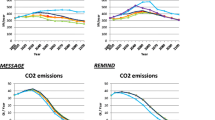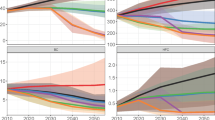Abstract
This article looks at the ability of Global Warming Potentials (GWPs) towork as indicators of equivalence for temperature development and damagecosts. We look at two abatement scenarios that are equivalent when using100-year GWPs: one scenario reduces short-lived gases, mainly methane(CH4); the other scenario reduces carbon dioxide (CO2).Despite their equivalence in terms of CO2 equivalents, the scenariosdo not result in equal rates or levels of temperature change. The disparitiescontinue as we move further down the chain of causality toward damagecosts, measured either in terms of rate of climate change or level of climatechange. Compared to the CH4 mitigation scenario, the CO2mitigation scenario gives present value costs 1.3 and 1.5 times higher forlevel- and rate-dependent damage costs, respectively, assuming a discountrate of 3%. We also test the GWPs for other time horizons and theconclusions remain the same; using GWP as an index to reflect equivalentclimate effects and damage costs from emissions is questionable.
Similar content being viewed by others
References
Cline, W.C.: 1992, The Economics of Global Warming, Institute for International Economics, Washington, D.C.
Eckaus, R.S.: 1992, 'Comparing the effects of greenhouse gas emissions on global warming,' The Energy J. 13(1), 25–34.
Fankhauser, S.: 1992, Global Warming Damage Costs: Some Monetary Estimates, Working Paper 92:29, Centre for Social and Economic Research on the Global Environment, University College London, University of East Anglia.
Fankhauser, S.: 1994, 'The social costs of greenhouse gas emissions: An expected value approach', The Energy J. 15(2), 157–184.
Fuglestvedt, J.S., Berntsen, T.K., Godal, O. and Skodvin, T.: 2000, 'Climate implications of GWP-based reductions in greenhouse gas emissions', Geophys. Res. Lett. 27(3), 409–412.
Fuglestvedt, S.J. and Berntsen, T.: 1999, A Simple Model for Scenario Studies of Changes in Global Climate, Working Paper 1999:02, CICERO Center for International Climate and Environmental Research, Oslo.
Hammitt, J.K.: 1999, 'Evaluation endpoints and climate policy: Atmospheric stabilization, benefitcost analysis and near-term greenhouse-gas emissions', Climatic Change 41, 447–468.
Hammitt, J.K., Jain, A.K., Adams, J.L. and Wuebbles, D.J.: 1996, 'A welfare-based index for assessing environmental effects of greenhouse-gas emissions', Nature 381, 301–303.
Hansen, J., Sato, M., Ruedy, R., Lacis, A. and Oinas, V.: 2000, 'Global warming in the twenty-first century: An alternative scenario,' Proceedings of the National Academy of Sciences of the United States of America, 97(18), pp. 9875–9880.
Intergovernmental Panel on Climate Change (IPCC): 1995, Climate Change 1994: Radiative Forcing of Climate Change and an Evaluation of the IPCC IS92 Emission Scenarios, Reports of Working Groups I and III of the Intergovernmental Panel on Climate Change, forming part of the IPCC Special Report to the first Session of the Conference of the Parties to the UN Framework Convention on Climate Change, Cambridge University Press, Cambridge.
Intergovernmental Panel on Climate Change (IPCC): 1996a, Climate Change 1995: The Science of Climate Change, Contribution of Working Group I to the Second Assessment Report of the Intergovernmental Panel on Climate Change, Cambridge University Press, Cambridge.
Intergovernmental Panel on Climate Change (IPCC): 1996b, Climate Change 1995: Impacts, Adaptation and Mitigation of Climate Change, Contribution of Working Group II to the Second Assessment Report of the Intergovernmental Panel on Climate Change, Cambridge University Press, Cambridge.
Intergovernmental Panel on Climate Change (IPCC): 2001a, Climate Change 2001: The Scientific Basis, Contribution of Working Group I to the Third Assessment Report of the Intergovernmental Panel on Climate Change, Cambridge University Press, Cambridge.
Intergovernmental Panel on Climate Channge (IPCC): 2001b, Climate Change 2001: Impacts, Adaptation and Vulnerability, Contribution of Working Group II to the Third Assessment Report of the Intergovernmental Panel on Climate Change, Cambridge University Press, Cambridge.
Isaksen, I.S.A., Ramaswamy, V., Rodhe, H. and Wigley, T.M.L.: 1992, 'Radiative forcing of climate change', in J.T. Houghton, B.A. Allander and S.K. Varney (eds.), Climate Change 1992: The Supplementary Report to the IPCC Scientific Assessment, Cambridge University Press, Cambridge, pp. 47–68.
Joos, F., Bruno, M., Fink, R., Stocker, T.F., Siegenthaler, U., Le Quéré, C. and Sarmiento, J.L.: 1996,'An efficient and accurate representation of complex oceanic and biospheric models of anthropogenic carbon uptake', Tellus 48B, 397–417.
Kandlikar, M.: 1996, 'Indices for comparing greenhouse gas emissions: Integrating science and economics', Energy Economics 18, 265–281.
Leggett, J.A., Pepper, W.J. and Swart, R.J.: 1992, 'Emissions scenarios for the IPCC: An update', in J.T. Houghton, B.A. Allander and S.K. Varney (eds.), Climate Change 1992: The Supplementary Report to the IPCC Scientific Assessment, Cambridge University Press, Cambridge, pp. 69–95.
Manabe, S. and Stouffer, R.J.: 1995, 'Simulation of abrupt climate change induced by freshwater input to the North Atlantic Ocean', Science 378, 165–167.
Manne, A.S. and Richels, R.G.: 2001, 'An alternative approach to establishing trade-offs among greenhouse gases', Nature 410, 675–677.
Mendelsohn, R., Morrison, W., Schlesinger, M.E. and Andronova, N.G.: 2000, 'Country-specific market impacts of climate change', Climatic Change 45, 553–569.
Mendelsohn, R., Dinar, A. and Sanghi, A.: 2001, 'The effect of development on the climate sensitivity of agriculture', Envir. Devel. Econ. 6, 85–101.
Nordhaus, W.D.: 1991, 'To slow or not to slow: The economics of the greenhouse effects', The Economic J. 101, 920–937.
Nordhaus, W.D.: 1992, 'An optimal transition path for controlling greenhouse gases', Science 258, 1315–1319.
Nordhaus, W.D.: 1994, Managing the Global Commons, MIT Press, Cambridge, MA.
Nordhaus, W.D. and Boyer, J.: 1999, 'Warming the world: Economic models of global warming', Draft.
Nordhaus, W.D. and Boyer, J.: 2000, Roll the DICE Again: Economic Modeling of Climate Change, Cambridge, Ma, MIT Press.
O'Brien, K. and Leichenko, R. 2000, 'Double exposure: Assessing the impacts of climate change within the context of economic globalization', Gl. Envir. Change 10, 221–232.
O'Neill, B.C.: 2000, 'The jury is still out on global warming potentials', Climatic Change 44, 427–443.
Pearce, D.W., Cline, W.R., Achanta, A.N., Fankhauser, S., Pachauri, R.K., Tol, R.S.J. and Vellinga, P.: 1996, 'The social costs of climate change: Greenhouse damage and the benefits of control', in J.P. Bruce, H. Lee and E.F. Haites (eds.) Climate Change 1995: Economic and Social Dimensions — Contribution of Working Group III to the Second Assessment Report of the Intergovernmental Panel on Climate Change, Cambridge University Press, Cambridge, pp. 183–224.
Peck, S.C. and Teisberg, T.J.: 1992, 'CETA: A model for carbon emissions trajectory assessment', Energy J. 13(1), 71–91.
Reilly, J.M. and Richards, K.R.: 1993, 'Climate change damage and the trace gas index issue', Envir. Res. Econ. 3, 41–61.
Schlesinger, M.E., Jiang, X. and Charlson, R.J.: 1992, 'Implications of anthropogenic atmospheric sulphate for the sensitivity of the climate system', in L. Rosen and R. Glasser (eds.), Climate Change and Energy Policy: Proceedings of the International Conference on Global Climate Change: Its Mitigation Through Improved Production and Use of Energy, Los Alamos National Laboratory, New Mexico, 21—24 October, American Institute of Physics, New York, pp. 75–108.
Schmalensee, R.: 1993, 'Comparing greenhouse gases for policy purposes', The Energy J. 14(1), 245–255.
Skodvin, T. and Fuglestvedt, J.S.: 1997, 'A comprehensive approach to climate change: Political and scientific considerations, Ambio 26(6), 351–358.
Smith, S.J. and Wigley, T.M.L.: 2000, 'Global warming potentials: 1. Climatic implications of emissions reductions', Climatic Change 44, 445–457.
Tol, R.S.J.: 1995, 'The damage costs of climate change: Towards more comprehensive calculations', Envir. Res. Econ. 5, 353–374.
Tol, R.S.J.: 1999a, 'New estimates of the damage costs of climate change. Part I: Benchmark estimates', Environmental and Resource Economics (in press).
Tol, R.S.J.: 1999b, 'New estimates of the damage costs of climate change. Part II: Dynamic estimates', Environmental and Resource Economics (in press).
Tol, R.S.J., Downing, T.E., Fankhauser, S., Richels, R.G. and Smith, J.B.: 2001, 'Progress in estimating the marginal costs of greenhouse gas emissions', J. Poll. Atmospherique (in press).
Titus, J.: 1992, 'The cost of climate change to the United States', in S.K. Majumdar, L.S. Kalkstein, B. Yarnal, E.W. Miller and L.M. Rosenfeld (eds.), Global Climate Change: Implications Challenges and Mitigation Measures, Pennsylvania Academy of Science, Pennsylvania.
Wigley, T.M.L.: 1998, 'The Kyoto Protocol: CO2, CH4 and climate implications', Geophys. Res. Lett. 25, 2289–2292.
Rights and permissions
About this article
Cite this article
Sygna, L., Fuglestvedt, J.S. & Aaheim, H.A. The adequacy of GWPs as indicators of damage costsincurred by global warming. Mitigation and Adaptation Strategies for Global Change 7, 45–62 (2002). https://doi.org/10.1023/A:1015879109042
Issue Date:
DOI: https://doi.org/10.1023/A:1015879109042




